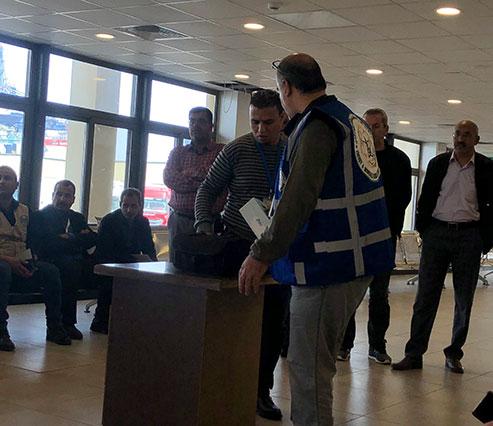You are here
Radiation monitoring systems inaugurated at Queen Alia, Amman Civil airports
By JT - May 25,2021 - Last updated at May 25,2021
AMMAN — Chairman of the Board of Commissioners of the Energy and Minerals Regulatory Commission (EMRC) Hussein Al Laboun on Tuesday, in the presence of Canadian Ambassador to Jordan Donica Pottie, inaugurated the radiation monitoring system project at Queen Alia International Airport (QAIA) and Amman Civil Airport (ACA).
This project was funded by the Canadian government as part of an agreement to enhance the Kingdom’s capabilities in the field of nuclear security, according to an EMRC statement.
In a press statement after the inauguration ceremony, Laboun emphasised the significance of the project in improving the country’s capability to confront illicit trafficking of nuclear and radioactive material throughout the Jordanian borderline.
This implementation phase comes at a budget of CAD4.5 million out of a bilateral agreement between the two governments that is worth CAD 30 million dedicated to enhance Jordan nuclear security infrastructure, through which the EMRC was provided with radiation detection equipment at the Jordan Valley Crossing (King Hussein Bridge), Al Mudawara border crossing, South Wadi Araba crossing, Amman Civil Airport/airfreight and passengers, King Hussein International Airport and Queen Alia International Airport.
Fifty-three fixed radiation detection devices were installed at these borders crossing points to inspect vehicles coming and leaving the Kingdom’s territories, as well as portable radiation detection devices used to identify the specific type of radio-isotopes in secondary screening operations for vehicles and cargo.
In addition, equipment and devices used for decontamination, and mobile laboratories to monitor the radiation levels in the air were provided.
Sixteen radiation monitoring stations (among a total of 19 distributed throughout the Kingdom) were installed to continuously monitor radioactivity in the surrounding environment.
Last year, the EMRC conducted more than 1.5 million radiological screening cases at all border gates.
According to Laboun, the EMRC plays its regulatory role at the border crossings through its staff on 88 radiation detection gates and four locomotive radiation detection vehicles covering land, maritime and air borders, all of which are equipped with state-of the-art stationary and mobile systems to monitor radiation levels and verify that they do not exceed the permissible limits.
All the radiation detection systems at the ports are connected to the monitoring and emergency centre at the EMRC headquarters.
The Law of Radiation Protection and Nuclear Safety and Security mandates the commission to regulate and control the radiation and nuclear sector in the Kingdom, including cross-borders monitoring and shipments inspections, whether for import, export, transit or re-export throughout the Jordanian borderlines.
Pottie commended the role of the EMRC in the protection and security of the Jordan borders, as the project included installing devices at border crossings to prevent the entry of radioactive or unauthorised materials to protect borders and airports.
She also expressed the Canadian government’s continuous support in this regard.
Related Articles
AMMAN — A shipment of radioactively contaminated pipes, with excess levels of Radium 226, was returned to its country of origin on Tuesday a
AMMAN — For the second time in three weeks, a shipment of radioactively contaminated pipes, with excess levels of Radium 226, was returned t
AQABA — There are 88 radiation detectors at the Kingdom's land, sea and air crossings, according to Nuclear Security Director at the Energy












